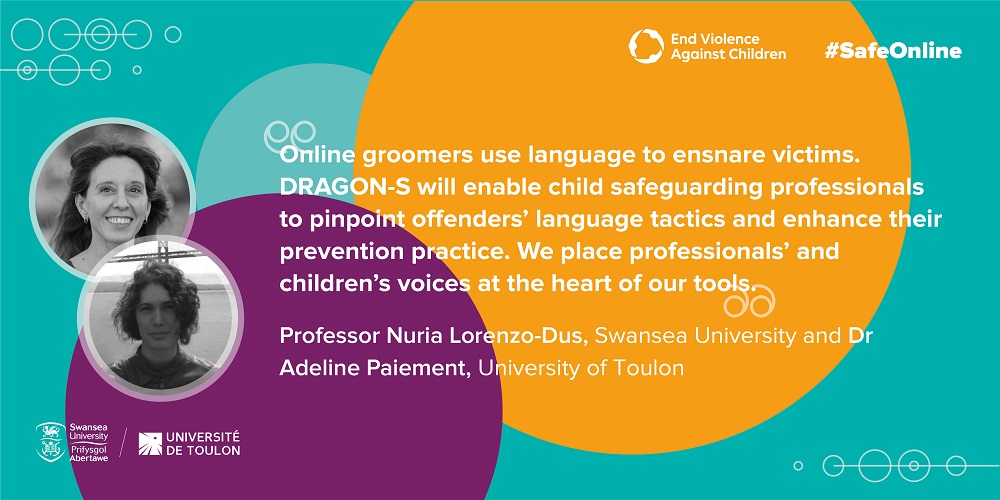
End Violence has invested $10 million more to keep children #SafeOnline. Through our latest funding round, we are welcoming 14 new projects into our Safe Online portfolio – all of which are using cutting-edge technology to fight online child sexual exploitation and abuse.
Our Digital Groundbreaker series was created to introduce the End Violence community to the grantees spearheading these new projects. Each week, we are profiling a different grantee from our newest funding round, each of which was given $450,000-$750,000 to push a solution to online violence forward.
Today, we are focusing on Swansea University, which will use End Violence funding to launch Project DRAGON-S, which will offer AI tools to enable law enforcement to spot online grooming content in real-time. End Violence spoke with Professor Nuria Lorenzo-Dus to learn more about Swansea's priorities, programme, and insights around online exploitation and abuse.
What do you feel is the biggest threat to children online?
The internet offers many enriching experiences and opportunities for children to develop healthy relationships and satisfy their natural curiosity about the world. Not unlike most adults, children do not see online and offline as separate realms: friends are friends, online and/or offline; information comes from offline and/or online sources. Sadly, the internet also opens multiple gates for others to take advantage of these very opportunities. When this is done with the goal of sexual abuse and exploitation, the impact is utterly devastating for children.
Online child sexual grooming is a key threat in this respect. Online groomers use language (and other means – e.g. images) to form a relationship with their victims. They use communicative manipulation to gain and then betray children’s trust, exploiting children’s wonderful sociability, kind-heartedness, and curiosity. This form of exploitation and abuse must be stopped.
HOW WILL THE NEW FUNDING FROM END VIOLENCE ENABLE YOU TO DO TACKLE THAT THREAT? WHAT ARE THE KEY EXPECTED RESULTS OF YOUR PROJECT?
End Violence’s funding will enable Project DRAGON-S to implement two interrelated digital interventions to detect and prevent online child sexual grooming. One of them is an Online Grooming Spotter: a hybrid, Linguistics- and AI-based application designed to enable law enforcement to increase detection speed and efficiency by pinpointing communicatively evidenced groomer goals - such as developing children’s trust or effectively isolating them.
The other tool, our Online Grooming Shield, will provide research-based training for child safeguarding professionals about groomers’ and children’s communicative behaviours during online grooming. It will be deployed as a web-based application, with offline access and an embedded AI/Linguistics chatbot. Both tools will enable end-users to understand and better trust the AI decision process when identifying online grooming content.
WHAT WAS YOUR ORGANISATION’S MOST SUCCESSFUL EXPERIENCE AGAINST ONLINE VIOLENCE IN THE PAST?
Swansea University has extensive expertise in the development and testing of AI and Linguistics research outputs aimed at protecting children from harm, on and offline, and at having their voices heard. Two of our most successful initiatives, both of direct relevance to project DRAGON-S, are
- The AI/Linguistics model integration underpinning our Online Grooming Spotter and the UX-based, knowledge transfer model underpinning our Online Grooming Shield (co-created with child safeguarding professionals and children in Wales, UK);
- A web framework and chatbot to improve children’s rights access in Wales, UK.
The research behind these developments has been published as academic papers and presented at numerous academic and public engagement events.
Project DRAGON-S is supported by a multidisciplinary core team that has demonstrated the ability to co-produce high quality, ethically responsible outputs, and an extended team that includes world-recognised researchers as part of a global academic / industry expert network. We are all passionately committed to tackling online child sexual grooming through research innovation and collaboration.
What motivates you, as an individual, to work on this subject?
There are two main motivations. First, I am an enthusiastic champion of applied research. I believe that the rigorous and pioneer knowledge that we generate in Universities around the world can, and must, be translated into practical solutions. Open collaboration is the key to success here. In the case of Project DRAGON-S, we fuse state of the art methods in AI and Linguistics to co-develop, with our stakeholders' end-user groups, human-centered solutions to spot online child sexual grooming and help child safeguarding professionals to shield the children they work with from it.
Second, online child sexual grooming is currently a major obstacle to making the internet a safe space for children. Online groomers’ insidious tactics mean we must come up with sophisticated disruption tools. We know, for example, that online groomers use both explicit and implicit sexual language to entrap children. Through Project DRAGON-S, child safeguarding professionals will be empowered to upskill their knowledge of both groomers’ communicative tactics and children’s communicative behaviours during grooming. It’s this opportunity to contribute to support front-line professionals in their efforts to keep our children safe from online sexual abuse and exploitation that also motivates me – and the Project DRAGON-S team – to work in this space.
If you had a superpower to do ONE thing that could end online sexual exploitation and abuse, what would it be?
Without a doubt, my superpower would be to enable true collaboration on a global scale. Across countries and actors, there is real innovation potential and a huge appetite to tackle online sexual exploitation and abuse, and an impressive set of projects already delivering excellent outcomes. Most of them are data-driven and could benefit from data and knowledge sharing. To be able to create a safe, border-less environment in which to channel and facilitate this level of sharing would be a real game-changer.